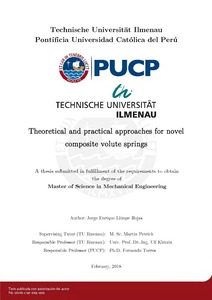| dc.contributor.advisor | Torres, Fernando | |
| dc.contributor.author | Llimpe Rojas, Jorge Enrique | es_ES |
| dc.date.accessioned | 2018-03-14T00:16:58Z | es_ES |
| dc.date.available | 2018-03-14T00:16:58Z | es_ES |
| dc.date.created | 2018 | es_ES |
| dc.date.issued | 2018-03-14 | es_ES |
| dc.identifier.uri | http://hdl.handle.net/20.500.12404/11172 | |
| dc.description.abstract | A combined experimental/analytical approach for an efficient evaluation of stiffness
and characteristic curves of fiber reinforced plastic volute springs is presented
in this work.
Before performing the analysis mentioned in previous lines, in the early chapters,
it can find the most common types of fibers, resins (matrices) and manufacturing processes
used to produce composite laminates been briefly described. It also describes
the analytical approaches that currently exist to determine the elastic constants of
composites such as the longitudinal and transversal modulus, Poisson’s ratios and
shear moduli; it also describes the improved and semi-empirical formulas to calculate
the effective shear moduli and the transversal modulus. At the end of the chapter,
some manufacturing methods of fiber reinforced plastic springs are described.
Since fiber reinforced plastic volute springs are novel products, the fourth chapter
presents and describes basic considerations that it must be taken into account when
selecting material (fibers, resins, and additives) to manufacture these springs. At
the end of the chapter, a method to produce volute springs is presented.
The fifth chapter presents the elastic constant calculations for laminates used
to manufacture volute springs. An experimental/analytical method has also been
performed to determine in-plane and out-of-plane shear moduli since these material
constants are of greater importance in the rate spring calculation hence any crosssection
of these springs shows the major load being torsional. On the one hand the
analytical method to calculate these shear moduli is based on Sumsion’s guidelines
that use the theory developed by Lekhnitskii for anisotropic materials; on the other
hand, it has been done torsion test of rectangular bars, which were manufactured
using vacuum infusion method, to obtain shear moduli experimentally.
Finally, calculated values of shear moduli are used to determine stiffness and
characteristic curves of volute springs in an analytical and experimental method. It
is proposed to use the in-plane shear modulus in the classical calculation method for
steel volute springs and to compare results obtained with compression test results
carried out on fiber reinforced plastic volute springs.
Consistent results are achieved by performing this combined analytical and experimental
method concluding that the best behavior of fiber reinforced plastic
volute springs is when fibers have an orientation of +/ 45° concerning the main axis
of the laminate. | es_ES |
| dc.description.uri | Tesis | es_ES |
| dc.language.iso | eng | es_ES |
| dc.publisher | Pontificia Universidad Católica del Perú | es_ES |
| dc.rights | Atribución-NoComercial-SinDerivadas 2.5 Perú | * |
| dc.rights | info:eu-repo/semantics/openAccess | es_ES |
| dc.rights.uri | http://creativecommons.org/licenses/by-nc-nd/2.5/pe/ | * |
| dc.subject | Fibras--Plástico | es_ES |
| dc.subject | Muelles (Mecánica)--Plástico | es_ES |
| dc.title | Theoretical and practical approaches for novel composite evolute springs | es_ES |
| dc.type | info:eu-repo/semantics/masterThesis | es_ES |
| thesis.degree.name | Magíster en Ingeniería Mecánica | es_ES |
| thesis.degree.level | Maestría | es_ES |
| thesis.degree.grantor | Pontificia Universidad Católica del Perú. Escuela de Posgrado | es_ES |
| thesis.degree.discipline | Ingeniería Mecánica | es_ES |
| renati.advisor.dni | 07879100 | |
| renati.discipline | 713347 | es_ES |
| renati.level | https://purl.org/pe-repo/renati/level#maestro | es_ES |
| renati.type | http://purl.org/pe-repo/renati/type#tesis | es_ES |
| dc.publisher.country | PE | es_ES |
| dc.subject.ocde | https://purl.org/pe-repo/ocde/ford#2.03.01 | es_ES |






